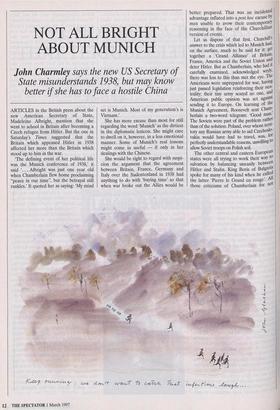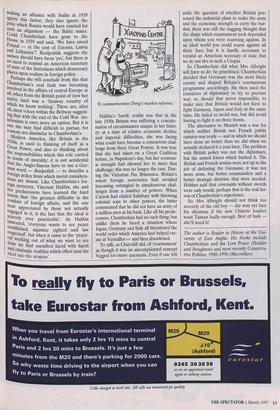NOT ALL BRIGHT ABOUT MUNICH
John Charmley says the new US Secretary of
State misunderstands 1938, but may know better if she has to face a hostile China
ARTICLES in the British press about the new American Secretary of State, Madeleine Albright, mention that she went to school in Britain after becoming a Czech refugee from Hitler. But the one in Saturday's Times suggested that the Britain which appeased Hitler in 1938 affected her more than the Britain which stood up to him in the war.
`The defining event of her political life was the Munich conference of 1938,' it said `. . Albright was just one year old when Chamberlain flew home proclaiming "peace in our time", but the betrayal still rankles.' It quoted her as saying: 'My mind set is Munich. Most of my generation's is Vietnam.'
She has more excuse than most for still regarding the word 'Munich' as the dirtiest in the diplomatic lexicon. She might care to dwell on it, however, in a less emotional manner. Some of Munich's real lessons might come in useful — if only in her dealings with the Chinese.
She would be right to regard with suspi- cion the argument that the agreement between Britain, France, Germany and Italy over the Sudentenland in 1938 had anything to do with 'buying time' so that when war broke out the Allies would be better prepared. That was an incidental advantage inflated into a post hoc excuse by men unable to avow their contemporary reasoning in the face of the Churchillian version of events.
Let us dispose of that first. Churchill's answer to the crisis which led to Munich had, on the surface, much to be said for it get together a 'Grand Alliance' of Britain, France, America and the Soviet Union and deter Hitler. But as Chamberlain, who had it carefully examined, acknowledged wrylY, there was less to this than met the eye. The Americans were unprepared for war, having just passed legislation reinforcing their neu- trality; their tiny army scared no one, and American public opinion was set against sending it to Europe. On learning of the Munich Agreement, Roosevelt sent Chain; berlain a two-word telegram: 'Good man.' The Soviets were part of the problem rather than of the solution. Poland, over whose terri- tory any Russian army able to aid Czechoslo- vakia would have had to travel, was, for perfectly understandable reasons, unwilling to allow Soviet troops on Polish soil. The other central and eastern European states were all trying to work their way to salvation by balancing uneasily between Hitler and Stalin. King Boris of Bulgaria spoke for many of his kind when he called the latter 'Pierre le Grand en rouge'. All those criticisms of Chamberlain for not Making an alliance with Stalin in 1939 ignore this factor; they also ignore the price which Russia would have exacted for such an alignment — the Baltic states. Could Chamberlain have gone to the House in 1939 and said, 'We have saved Poland — at the cost of Estonia, Latvia and Lithuania'? Realpolitik suggests the answer should have been 'yes', but there is no need to remind an American secretary of state of the limitations which democracy places upon realism in foreign policy. Perhaps she will conclude from this that Chamberlain's real fault was becoming involved in the affairs of central Europe at all, when from the British point of view her native land was a 'faraway country of which we know nothing', There are, after all, siren voices within the Beltway suggest- ing that with the end of the Cold War iso- lationism is once more an option. But it is One she may find difficult to pursue, for reasons not dissimilar to Chamberlain's. Modern America, like Britain in the 1930s, is used to thinking of itself as a Great Power, and also to thinking about the responsibilities which this role carried in terms of morality; it is not accidental that the Anglo-Saxons have to use a Ger- man word — Realpolitik — to describe a foreign Policy from which moral considera- tions are absent. Like Chamberlain's for- eign secretary, Viscount Halifax, she and her predecessors have learned the hard lesson that 'the greatest difficulty in the conduct of foreign affairs, and the one least appreciated by those not actually engaged in it, is the fact that the ideal is scarcely ever practicable'. As Halifax lamented, 'everyone wants to see peace established, injustice righted and law respected', but when it came to the 'practi- cal working out of what we want to see done we find ourselves faced with harsh and obstinate realities which often turn the ideal into the utopian'. 'It commemorates Deng's market reforms.'
Halifax's 'harsh' reality was that in the late 1930s Britain was suffering a concate- nation of circumstances unique in her histo- ry: at a time of relative economic decline and imperial difficulties, she was facing what could have become a concurrent chal- lenge from three Great Powers. It was true that she had taken on a Great Coalition before, in Napoleon's day, but her econom- ic strength had allowed her to meet that challenge; this was no longer the case. Dur- ing the Victorian Pax Britannica, Britain's wisest foreign secretaries had avoided becoming entangled in simultaneous chal- lenges from a number of powers. When Curzon had chided Salisbury with throwing colonial sops to other powers, the latter commented that he did not have an army of a million men at his back. Like all his prede- cessors, Chamberlain had no such thing; but unlike them he faced a situation where Japan, Germany and Italy all threatened the world order which America had helped cre- ate at Versailles — and then abandoned.
To talk, as Churchill did, of 'rearmament' as though it was an uncomplicated concept begged too many questions. Even if one left aside the question of whether Britain pos- sessed the industrial plant to make the arms and the economic strength to carry the bur- den, there was still the nagging thought that the shape which rearmament took depended upon whom you were rearming against. In an ideal world you could rearm against all three foes, but it is hardly necessary to remind an American secretary of state that we do not live in such a Utopia.
So Chamberlain did what Mrs Albright will have to do: he prioritised. Chamberlain decided that Germany was the most likely enemy and shaped Britain's rearmament programme accordingly. He then used the resources of diplomacy to try to prevent war; or, should that prove impossible, to make sure that Britain would not have to fight Germany, Japan and Italy at the same time. He failed to avoid war, but did avoid having to fight it on three fronts.
The alternative to Munich was a war for which neither British nor French public opinion was ready — and in which we should have done no better than we did when we actually declared it a year later. The problem with British policy was not the diplomacy, but the armed forces which backed it. The British and French armies were not up to the job of defeating the Germans; it was not more arms, but better commanders and a better strategic doctrine that were needed. Hobbes said that covenants without swords were only words; perhaps that is the real les- son of Chamberlain's experience.
So, Mrs Albright should not think too severely of the old boy — she may yet face his dilemma if the new Chinese leaders want Taiwan badly enough. Best of luck she'll need it!



























































 Previous page
Previous page